Verdi – Don Carlos
Don Carlos – Charles Castronovo
Philippe II – Dmitry Ulyanov
Élisabeth de Valois – Rachel Willis-Sørensen
Rodrigue, marquis de Posa – Stéphane Degout
La princesse Éboli – Ève-Maud Hubeaux
Le Grand Inquisiteur – Li Liang
Thibault – Ena Pongrac
Un moine – William Meinert
Le Comte de Lerme – Julien Henric
Une voix céleste – Giulia Bolcato
Les Députés de Flandre – Raphaël Hardmeyer, Benjamin Molonfalean, Joé Bertili, Edwin Kaye, Marc Mazuir, Timothée Varon
Chœur du Grand Théâtre de Genève, Orchestre de la Suisse Romande / Marc Minkowski.
Stage director – Lydia Steier
Grand Théâtre de Genève, Geneva, Switzerland. Sunday, September 17th, 2023.
To open its 2023 – 24 season, the Grand Théâtre de Genève has gone big, giving us the five-act version of Don Carlos, en français, including ballets. This new production was confided to Lydia Steier, a director who has worked extensively in Germany, a cast made up of both Francophone singers and non-Francophone singers with a positive track record in singing in the langue de Molière, all placed under the musical direction of that experienced conductor of French music, Marc Minkowski.
Steier sets her staging in what appears to be communist East Berlin. The costumes, by Ursula Kudrna, are redolent of the 1970s, with Stéphane Degout’s Posa wearing a fetching tartan suit and riding boots. The revolving set, by Momme Hinrichs, allows us to perceive shadowy figures behind the walls listening in, or groups of monks parading around with headphones on their heads. The East Berlin setting makes for an intriguing framework for an opera that focuses on the tension between individual freedom and the dominance of an all-powerful structure, in the case of Don Carlos the church and crown. At moments, Steier had extras open up windows at the top of the set, as if to say ‘look at us, we’re listening in!’. This idea worked well in the Act 2 Posa/Philippe confrontation, where a clearly rattled Philippe took Posa to the exterior of the set, as if to find a place where they wouldn’t be heard. At other points, it felt heavy-handed, in that it felt that Steier was unwilling to trust the attention span of the audience. Similarly, I found it hard to reconcile the idea of a clerical dictatorship in atheist East Germany, and instead wondered why Steier chose not to set the action in Franco-era Spain, which struck me as a much more potent comparison with the original.
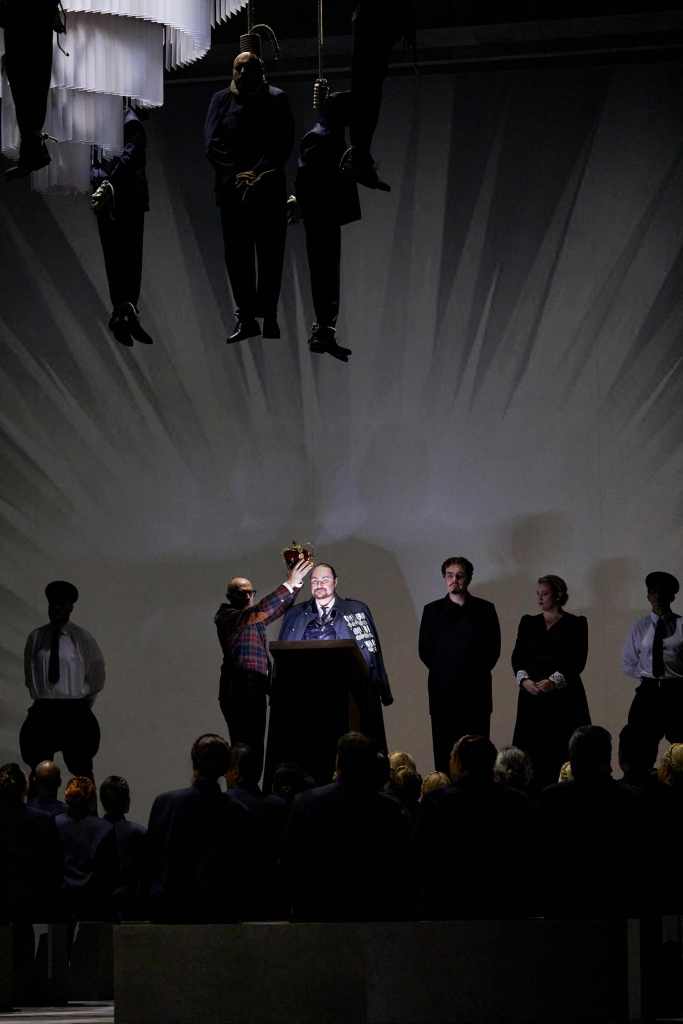
It must be admitted that Steier’s staging does contain some significant insight, not least in the individual performances of the principals – more on this below. Her direction of the chorus was rather inconsistent, however. The veil song was staged as a weigh-in session for the Queen’s attendants led by Eboli, with the choristers dancing in formation – complete with jazz hands. The opening chorus of Act 1, had the chorus members simply parked on stage; while in the Auto-da-fé, the chorus was lined up facing the wings, depriving us of the full impact of their singing, and not helped by the fact that the revolving set had been positioned for that moment with a pillar right in the centre of the stage, occluding the view. Indeed, I found the principals to not always be ideally placed acoustically on the set: Eboli sang her veil song from the back of the stage, and the principals would often be asked to sing to the wings. That said, I did find it an extremely compelling evening, just that there were some dramaturgical inconsistencies and less that optimal placing of the singers, both principals and chorus, on stage.
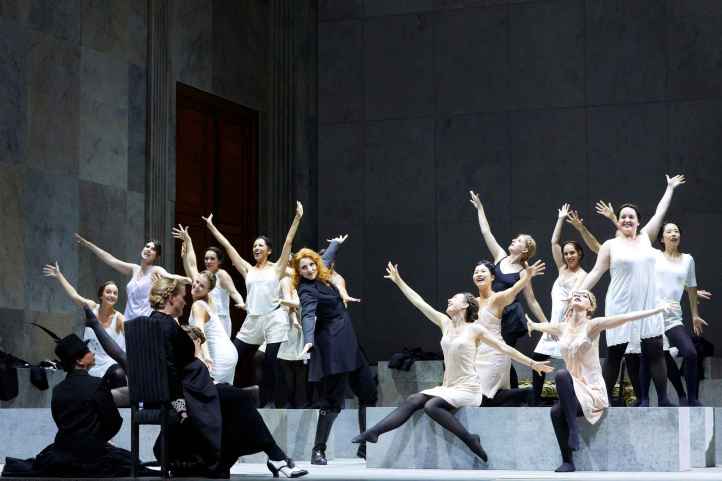
Even though this is one of the grandest of grands opéras, the focus on the personal and strong character development in Steier’s staging, found a match in Minkowski’s conducting. His was a reading that brought out the light and shade in the score, supporting his singers and allowing them to genuinely pull back the tone. This was especially noticeable in Act 1, where Charles Castronovo’s Carlos was able to sing his ‘Je l’ai vue’ with rapt poetry. Minkowski also founded his reading on a solid rhythmic framework, where attack was unanimous and kept the action moving along, despite the evening being performed with only a single intermission just before the Auto-da-Fé. There were, however, moments where tension did dip as he pulled back on the tempo – notably in the Carlos/Élisabeth duet in Act 2. Minkowski also obtained superb playing from the Orchestre de la Suisse Romande, strings played with minimal vibrato and a few isolated brass slips were understandable given the length of the evening. The chorus, prepared by Alan Woodbridge, sang with impeccable tuning, and some wonderfully resonant basses and deliciously tart mezzos.

Fewer than two months after seeing Castronovo sing the role in Italian in Munich, it was a pleasure to hear him sing the role in French here. Castronovo has long been a classy singer of the French repertoire and his Carlos was no exception. Over the intervening month and a half, Castronovo has clearly worked the role even more fully into the voice, using his exceptionally handsome tenor to shade the tone with delicacy and fill the words with meaning. Despite the long evening and additional music, Castronovo sounded utterly fresh from beginning to end, rising to a rousing account of the final duet with Rachel Willis-Sørensen’s Élisabeth. Through his vocalism and physicality, Castronovo’s Carlos was very much a lost soul, a dreamer fixated on what could, indeed should, have been.
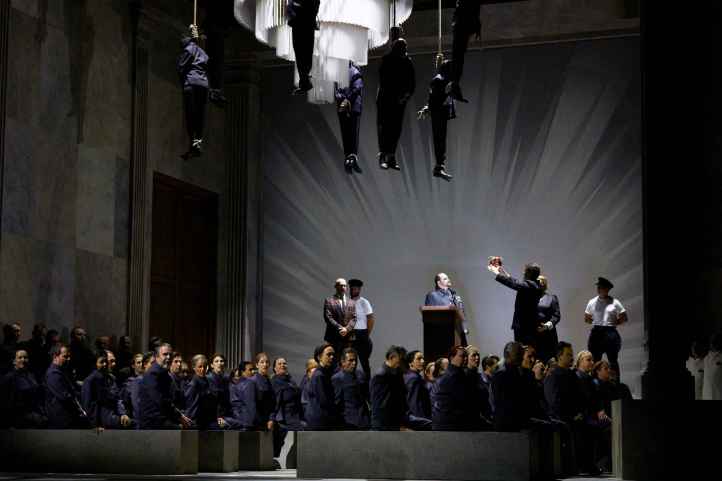
Willis-Sørensen had clearly worked extremely hard on the text for Élisabeth, the words nicely forward and clear, although there was a slight Anglophone perfume in her rather recessed ‘L’s. Her silvery soprano was a positive presence in the ensembles, and throughout, she phrased her music with dignity and feeling. It’s been a few years since I’ve had the pleasure of hearing Willis-Sørensen live and I did wonder if she was suffering from an unannounced indisposition. While the bottom of the voice was full and generous, I found the top to be rather metallic and shallow, the highest reaches not spinning, whereas previously I have found her to bloom gloriously on top. At lower dynamics I also found Willis-Sørensen’s tone to become somewhat brittle. During Acts 2 to 4, Steier had Willis-Sørensen playing Élisabeth as pregnant, which made her line ‘Pour moi, ma tâche est faite, et mon jour est fini’, as she pushed a baby stroller in ‘Toi qui sus le néant’, even more poignant.
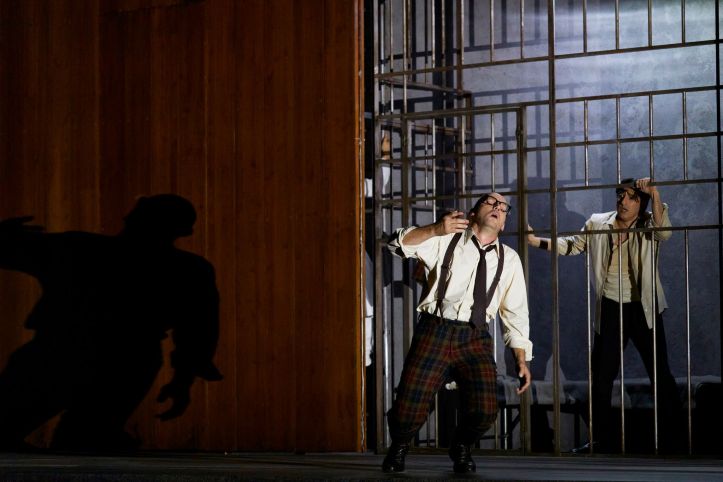
Degout brought a lieder singer’s focus and intensity to the role of Posa. His vocalism was fearless, singing with long, expansive phrases and firm tone throughout. The voice is so healthy and the text always so clear, words full of meaning. Degout’s ‘C’est mon jour, mon jour suprême’ was unbearably moving, filled with seemingly endless lines, masculine tone, the voice defying gravity as it soared to the top. Ève-Maud Hubeaux brought her silky, burgundy-toned mezzo to the role of Eboli. She was unafraid to exploit a generous chestiness which she used with abandon. I’m not quite convinced Hubeaux has the ultimate degree of agility for the veil song, but she emerged from it with her dignity intact. She’s an energetic actress, appearing at the back of the stage in her brassière in the king’s chambers, making Eboli’s affair with Philippe clear. In her ‘Ô don fatal’, Hubeaux went for it. She sustained the slow section most impressively, particularly given she had to sing it lying on her back. The big finish saw Hubeaux pouring out streams of big, radiant, soaring tone. It was exhilarating.
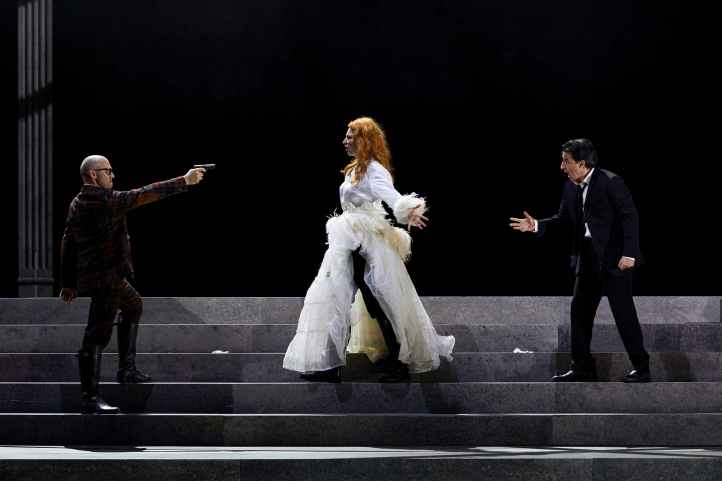
Graduating from the Inquistore in Munich, Dmitry Ulyanov made Philippe an even more complex and contradictory character than we often see. He was clearly broken in ‘Elle ne m’aime pas’, the realization that power was in no way a compensation for a lack of human contact utterly palpable. His French was very good, clearly living the words. Ulyanov’s confrontation with Li Liang’s Grand Inquisiteur, wasn’t just about two massive voices yelling at each other, but much more subtle than that. The light and shade they found in their interaction took us on a journey, so that when Philippe physically manhandled and threw the Inquisiteur out of his wheelchair, the loss of control was shocking, with Philippe doomed to forever be unable to break out of a system that he perpetuates. Li boomed imposingly, the words forward. The remaining roles reflected the excellent quality of the house. Julien Henric brought a bright and focused lyric tenor to the role of the Comte de Lerme. Ena Pongrac sang Thibault in an attractive mezzo and an energetic stage presence, while William Meinert gave us an impressively firm column of sound as the Moine. Giulia Bolcato sang the Voix céleste with appropriately crystalline tone and elegant melismas.

It was a genuine treat to her a Don Carlos, en français, where the text was so clear rendering the bilingual surtitles superfluous, and in such a complete edition. Steier has given us a character-led staging that shows a group of people lost in a world where happiness is impossible, yet unable to break out of a system that they each have a role in perpetuating. Yes, there were some aspects of her staging that I found heavy-handed, and the acoustic placement of the principals and chorus on set could have been more impactful. This was an evening that was musically at the highest level, that gave us compelling insights into the world in which these characters live. Above all it reminded me of how much this work benefits from being heard in French – especially with a cast such as this where the text was so clear. The audience rewarded the performance with generous applause.
[…] extrovert Eboli from Clémentine Margaine. In Geneva, Castronovo sang the title role in French in Don Carlos, with a mainly francophone cast, in a staging by Lydia Steier that had some good ideas, with […]